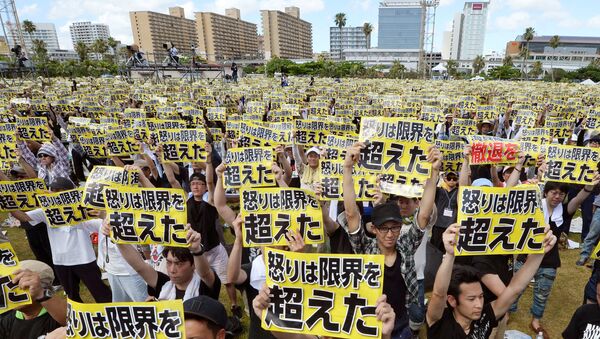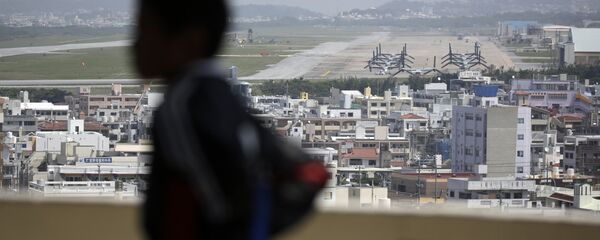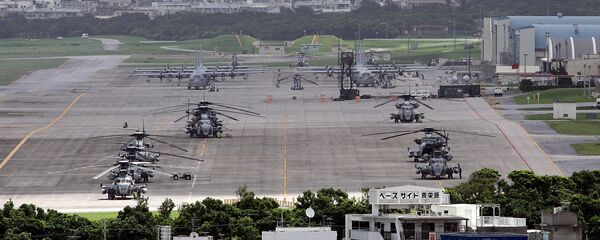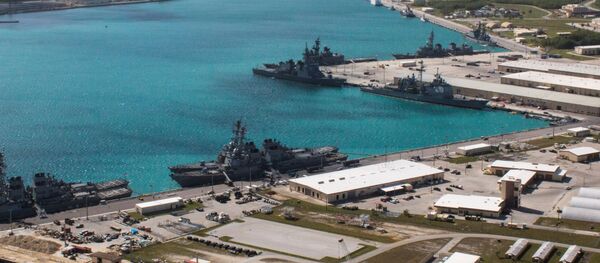"It happened nearly 44 years ago, in 1974 … It was a Marine, he was probably messed up after returning from the battlefield. He entered a bar to steal money and killed my mother. He did it to steal money, but ended up taking only $10 and running away," Kinjo told Sputnik.
The US soldier later went to a nearby hotel, confessed to the murder and was quickly arrested.
READ MORE: Relocation of US Okinawa Base Suspended at Local Authorities' Request — Reports
"He was imprisoned, but I was not told where. I do not know when he was released. I was not told why he killed her … It is very painful … In Okinawa US soldiers can get away even after killing a person. And the government would do nothing," Kinjo said.
Okinawa, which accounts for only 0.6 percent of Japan's territory, hosts over 30 US military installations — more than 70 percent of their total number in Japan — and nearly a half of the around 50,000 US forces deployed in the country.
Kinjo understood that he could not stand the US military presence even before his mother's murder. During classes at school, teachers would sometime address the issue by telling students that there was no good or justice in the arrangement as the presence of US troops caused many incidents and problems. The teachers would go on to explain that, despite all these troubles, that the Japanese government would do nothing about it due to its dependence on US military support.
"Back then I began to understand that the country was moving in a strange direction. I understood then that the Japanese government was in fact sacrificing Okinawa, while saying it adhered to peace," Kinjo said.
Seeking to Be Heard
Over the past years, a protest movement has been raging across Okinawa with thousands of people demanding that US troops be relocated elsewhere in Japan. The issue of relocating Marine Corps Air Station Futenma, which is currently situated in Okinawa's densely populated city of Ginowan, has taken central stage in demonstrations.
READ MORE: Tokyo, Okinawa Gov'ts Agree to Start Talks on US Base Relocation — Reports
Though the US and Japanese authorities struck a deal to move the base to the less populated Henoko area some 22 years ago, real work on preparing a new site was only launched in 2017. Local residents, however, strongly oppose the move, demanding that the base be relocated outside Okinawa so that other parts of the country share the prefecture’s burden.
The prefectural government stresses that the construction threatens the unique ecosystem of Oura Bay near Henoko.
"Over 5,800 species of creatures, including 262 endangered species, are confirmed to exist in the waters of Henoko and Oura Bay. The number of species there exceeds the number in the World Natural Heritage sites in Japan. It is our responsibility to preserve our proud, rich natural heritage for our children and grandchildren," the Okinawa government’s Washington DC office said on its official website.
Masanori Okuma, an activist and civil engineer, said that the government’s decision to go through with the reclamation despite the local authorities’ repeated requests to suspend it was "as much as to say that the will of Okinawans is not the will of Japanese people."
"An act of folly carried out by the government this time has become a day of humiliation for Okinawa. We want the whole world to turn their eyes to the situation in Japan … Uchinanchu – the people of Okinawa – are definitely not giving up!" Okuma told Sputnik.
Koji Sunagawa, a local resident actively engaged in the protest movement, questioned the very need for US military bases in Okinawa and their role in the country’s defense.
"I myself want [the Japanese government] to remove US military bases. The US military exists to protect the national interests of the United States, it is not supposed to be deployed for Japan's defense. Even though the official reason is said to be the protection of Japan under the US-Japan security alliance, if another country attacks Japan the United States will act based on its national interests," Sunagawa told Sputnik.
He underlined that there was no need to host four branches of the US military — the Navy, the Air Force, the Army and the Marines — on the same island, suggesting that some of them could be easily placed in other parts of the country.
"Even if it would be so troublesome not to have US troops in Japan, it would be better to relocate them to other places except for Okinawa," Sunagawa said.
Everyday Life Affected
Yoichi Iha, a member of the Japanese parliament’s upper house, has been actively engaged in campaigns against the US military's presence in Okinawa, including during his tenure as mayor of the city of Ginowan.
READ MORE: Japan to Resume Construction of Airfield for US Troops in Okinawa — Minister
"US military bases in Okinawa are disrupting residents' daily lives. Helicopters and Ospreys fly over residential areas until late night, even after 11 p.m. [14:05 GMT]. There is a large air base in Kadena, and jet fighters and transport aircraft fly around it every day, even at night," Iha told Sputnik.
The politician stressed that the presence of US troops in Okinawa made locals feel concerned for their own safety because of the numerous stories of violent crimes committed by them.
"Due to the US presence a lot of incidents involving women and children are taking place, such as sexual violence and murders. Violent crimes, especially rapes are happening frequently," Iha said.
The most infamous case occurred in 1995, when a 12-year-old local girl was abducted and gang-raped by three US servicemen who were serving at Camp Hansen in Okinawa. More recently, in 2016, a US military base worker raped and killed a 20-year-old woman. The man was sentenced to life imprisonment, and the case caused a public outcry.
"Cases like this have been taking place over the 70 years since the end of the World War II. That is why Okinawans strongly demand the withdrawal of US troops," Iha noted.
Mioko Ashimine, who lives right next to the Futenma airfield, complained that her house’s proximity to the base had affected her daily life even in the smallest ways — she can barely hear people on the phone or watch television due to the noise made by helicopters flying around the city during the day.
"Our daily lives are threatened. If you have a little child, it would wake up and cry because of the noise made by helicopters. Same happens to my grandchild," Ashimine told Sputnik.
The woman added that there were also a few cases when drunk US soldiers trespassed on the property of local residents, though she "had the luck" to avoid such an experience.
Aviation Mishaps
"I grew up as a child with this huge fear in my heart. That is why I live in anxiety worrying about when another serious accident involving a US military aircraft will take place," Nakamura told Sputnik.
The activists said that he had visited most crash sites since 2004 and was outraged by the fact that these incidents could have had much more tragic consequences than they actually did.
READ MORE: Fierce Critic of US Military Bases Elected as Governor of Okinawa
"In each case even the smallest mistake could have resulted in victims among residents and children. Although, miraculously, these accidents did not cause any injuries or casualties, the anxiety of people living near crash sites will not go away," Nakamura said.
Just over the past year, Okinawa has seen a number of such incidents. In December 2017, a window fell from a CH-53E helicopter onto the playground of the Futenma No. 2 Elementary School, slightly injuring one child. In January 2018, three US military AH-1 attack helicopters were forced to make emergency landings in Okinawa. In June, a US Air Force F-15 fighter jet, which was assigned to the Kadena base, crashed in the sea 80 kilometers (50 miles) from the city of Naha.
Lining in Crosshairs
"I think that if a war like those in the past breaks out, missiles will be fired right at Okinawa … Even if a single nuclear missile lands here, Okinawa will be wiped out. This island is like a military base itself, so every time something happens on the international arena, I feel scared. North Korea’s missiles are aimed at Okinawa, and if something happens, they will be fired at Okinawa, so we cannot feel at ease at all," the activist told Sputnik.
READ MORE: Japanese Calls Stray Bullet That Hit US Mil Base in Okinawa 'Serious Problem'
This fear has manifested itself in various forms. The man recalled that back in 2001, when two passenger planes crashed into the Twin Towers of the World Trade Center in a coordinated terrorist attacks, many people canceled their trips to Okinawa. This resulted in huge economic losses for the prefecture, which boasts unique beach resorts that attract tourists both from Japan’s mainland and abroad.
"People from Japan’s mainland felt after the New York terrorist attack that Okinawa, where US military bases are concentrated, was not safe too," he said.
Okinawa will hold a non-binding referendum on the relocation of the Futenma base on February 24. Governor Denny Tamaki said that the vote would be an important opportunity for Okinawans to make their concerns heard in Tokyo. Nearly 130,000 people have already signed a petition to the White House, filed by Okinawa's residents, calling for the reclamation process to be halted until the referendum.
The views and opinions expressed by the speaker do not necessarily reflect those of Sputnik.







